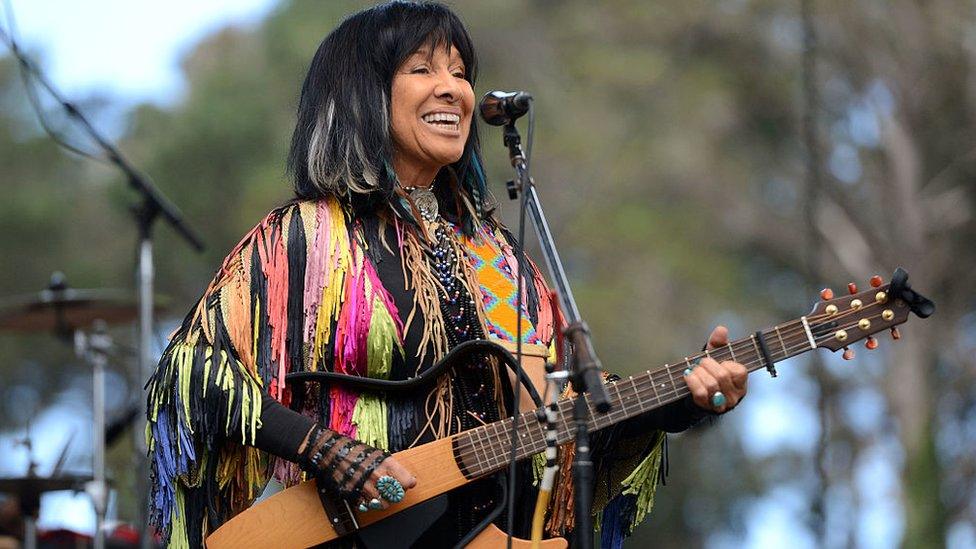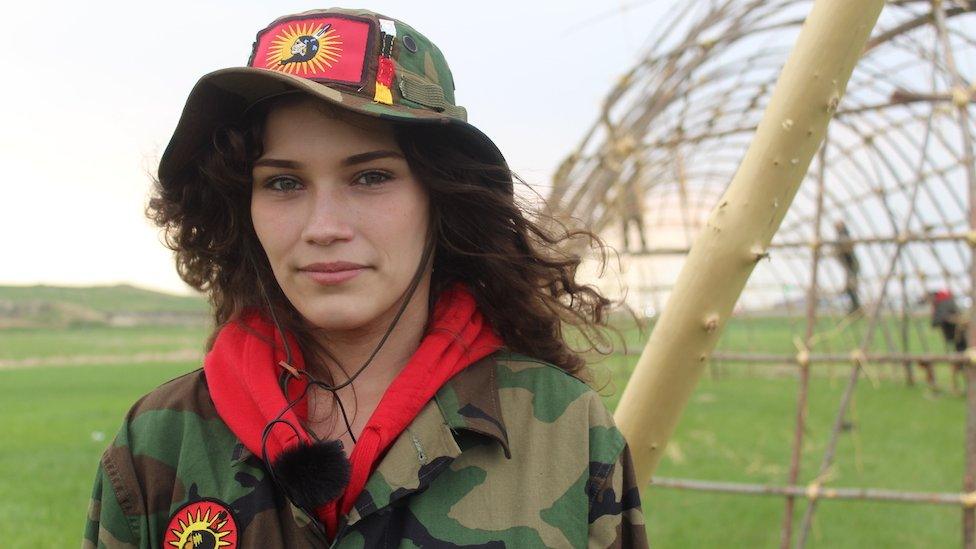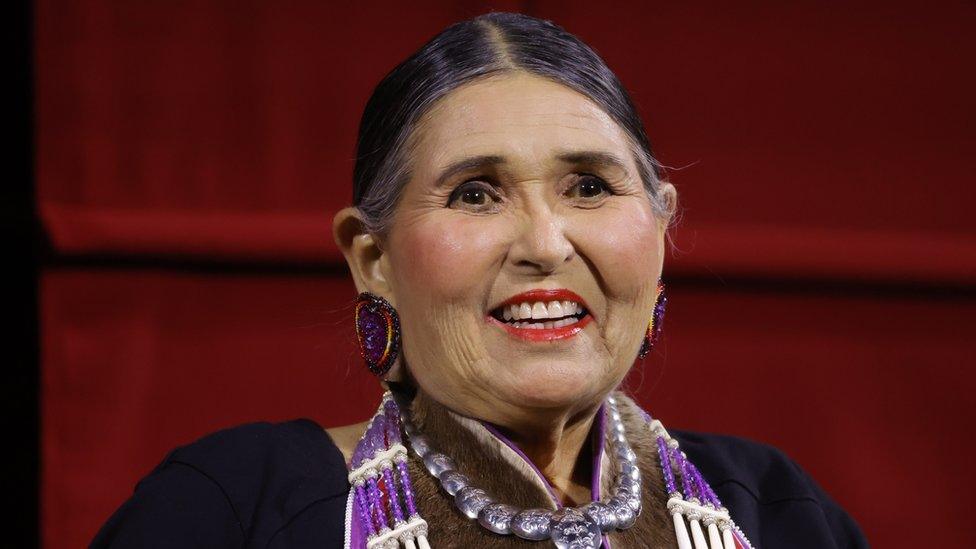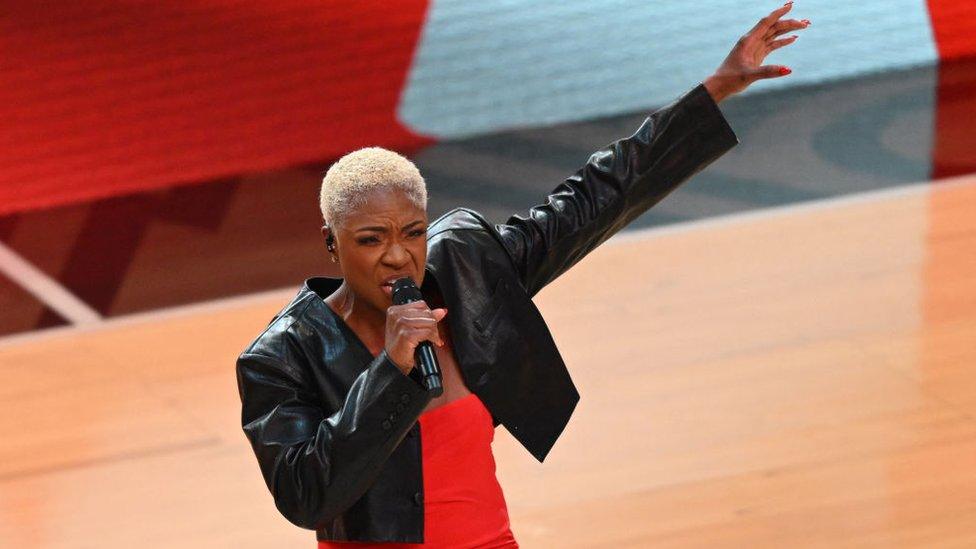Doubt cast on indigenous roots of Buffy Sainte-Marie
- Published

Buffy Sainte-Marie announced earlier this year that she would no longer be performing live, noting health concerns
Canada's public broadcaster has published a bombshell investigation that calls into doubt the indigenous ancestry of Buffy Sainte-Marie.
The folk singer and activist, who rose to fame in the 1960s, has long claimed indigenous ancestry from Canada.
She has said she was adopted by a white American couple as a baby.
But a CBC investigation claims to have found a birth certificate they say suggests her adoptive parents are her biological parents.
In a response published ahead of the CBC story, Sainte-Marie called the allegations "hurtful", adding: "I know who I am".
Sainte-Marie has said previously that she found she may have been adopted from members of the Piapot First Nation in Saskatchewan during the 60s Scoop, which is a term used to describe how thousands of indigenous children in Canada were forcibly removed from their families during the middle of the last century.
She connected with members of the community as a young woman, and they adopted her as a young adult.
Ahead of the CBC investigation, members of the Piapot First Nation issued a statement of support, saying: "Buffy is our family".
"I don't know where I'm from or who my birth parents were, and I will never know," Saint-Marie said in her statement. "Which is why to be questioned in this way today is painful, both for me, and for my two families I love so dearly."
Sainte-Marie rose to popularity during the hippie movement and has been known for decades of indigenous advocacy. She won an Oscar in 1983 for co-writing "Up Where We Belong" for the film An Officer and a Gentleman and is considered to be the first indigenous Oscar winner.
"I am proud of my Indigenous-American identity, and the deep ties I have to Canada and my Piapot family," she said in a statement on Thursday.
Her website says she "is believed to have been born in 1941 on the Piapot First Nation reserve in Saskatchewan…taken from her biological parents when she was an infant".
"She was adopted by a visibly white couple and raised in Maine and Massachusetts," the site reads. "As a child, Buffy's adoptive mother self-identified as part Mi'kmaq but knew little about indigenous culture."
But CBC says to have found her birth certificate, identifying her as Beverly Jean Santamaria, born to Albert and Winifred Santamaria, who declared their race as white on the document.
CBC cites a 2012 biography on Buffy Sainte-Marie by Blair Stonechild, which says the family changed its name from Santamaria to Saint-Marie "because of anti-Italian prejudice that developed during the Second World War".
The issue of who is indigenous - and who is not - has received much attention in recent years. A number of high-profile artists and scholars have had their indigenous ancestry, including Canadian author Joseph Boyden, called into question. Many indigenous communities view false representation of their identity as deeply problematic.
"It's theft of opportunities, resources. It's theft of our stories," Kim TallBear, a professor of Native Studies at the University of Alberta in Edmonton, told the CBC.
For her part, Sainte-Marie maintains she has never misrepresented herself, but acknowledges that some facts have been hard to prove.
In the statement, Sainte-Marie says that her mother told her she was adopted and that she was indigenous, "but there was no documentation as was common for Indigenous children born in the 1940's".
She goes on to say that as a young adult she was adopted into the Piapot family "in accordance with Cree law and customs."
In a statement of support for "Auntie Buffy", the Piapot family called the accusations "hurtful, ignorant, colonial - and racist".
"We grew up knowing that Buffy and our grandparents adopted each other and how deeply committed and loving they were to one another," they write. "We chose her and she chose us. We claim her as a member of our family and all of our family members are from the Piapot First Nation."
"For my entire life, I have championed Indigenous and Native American causes when nobody else would or had the platform to do so," Sainte-Marie's statement said.
Related topics
- Published28 July 2023

- Published3 October 2022

- Published21 February 2023
